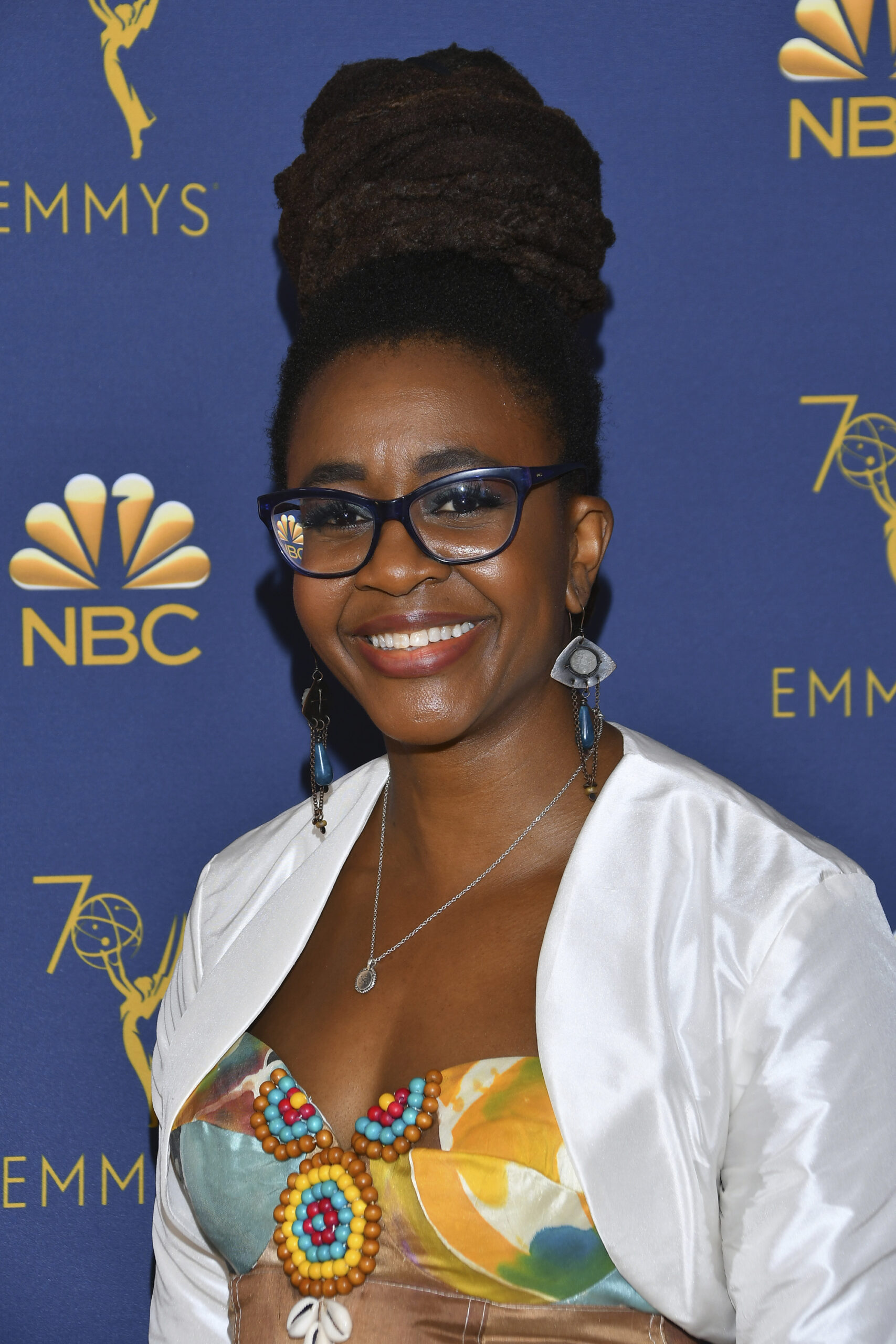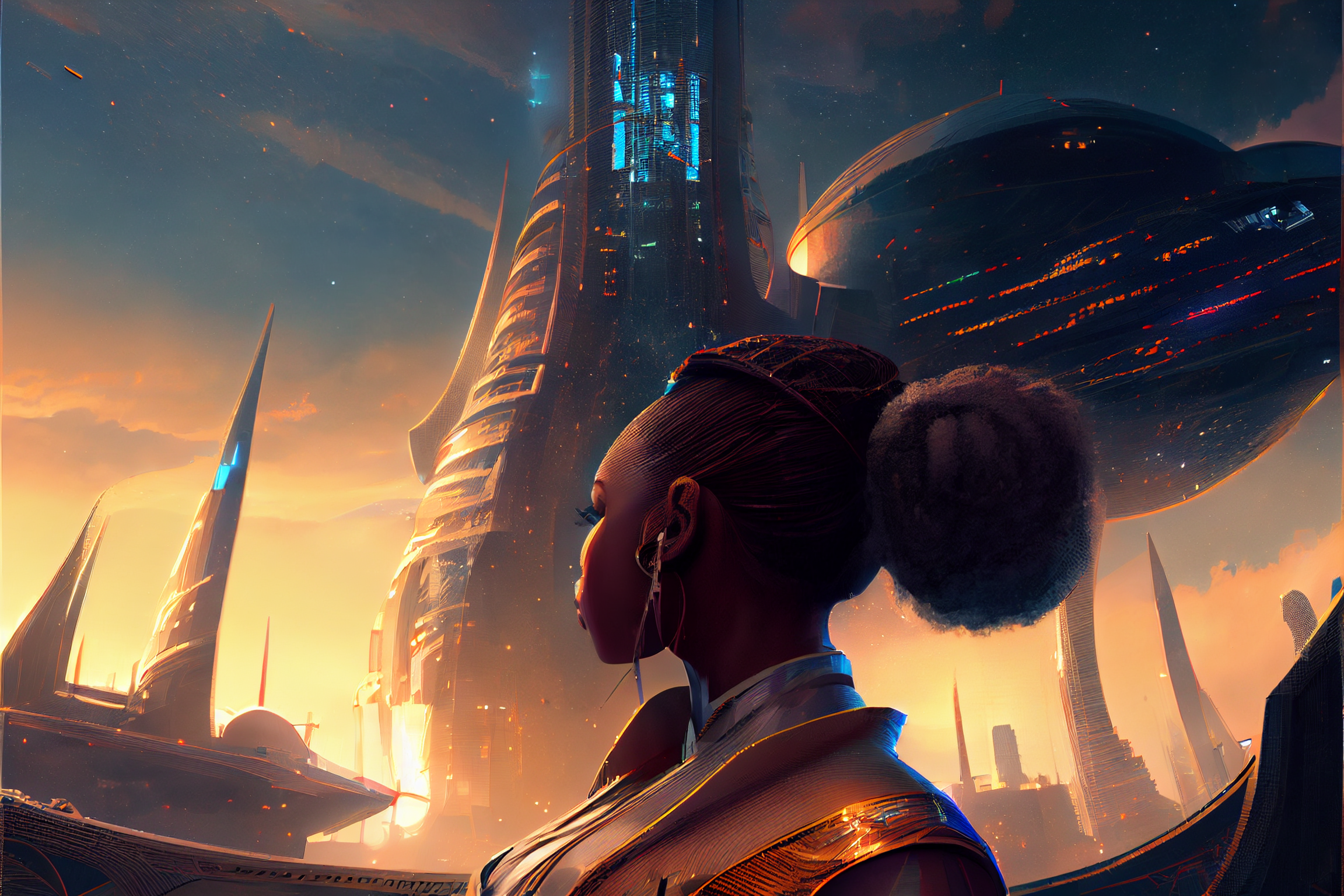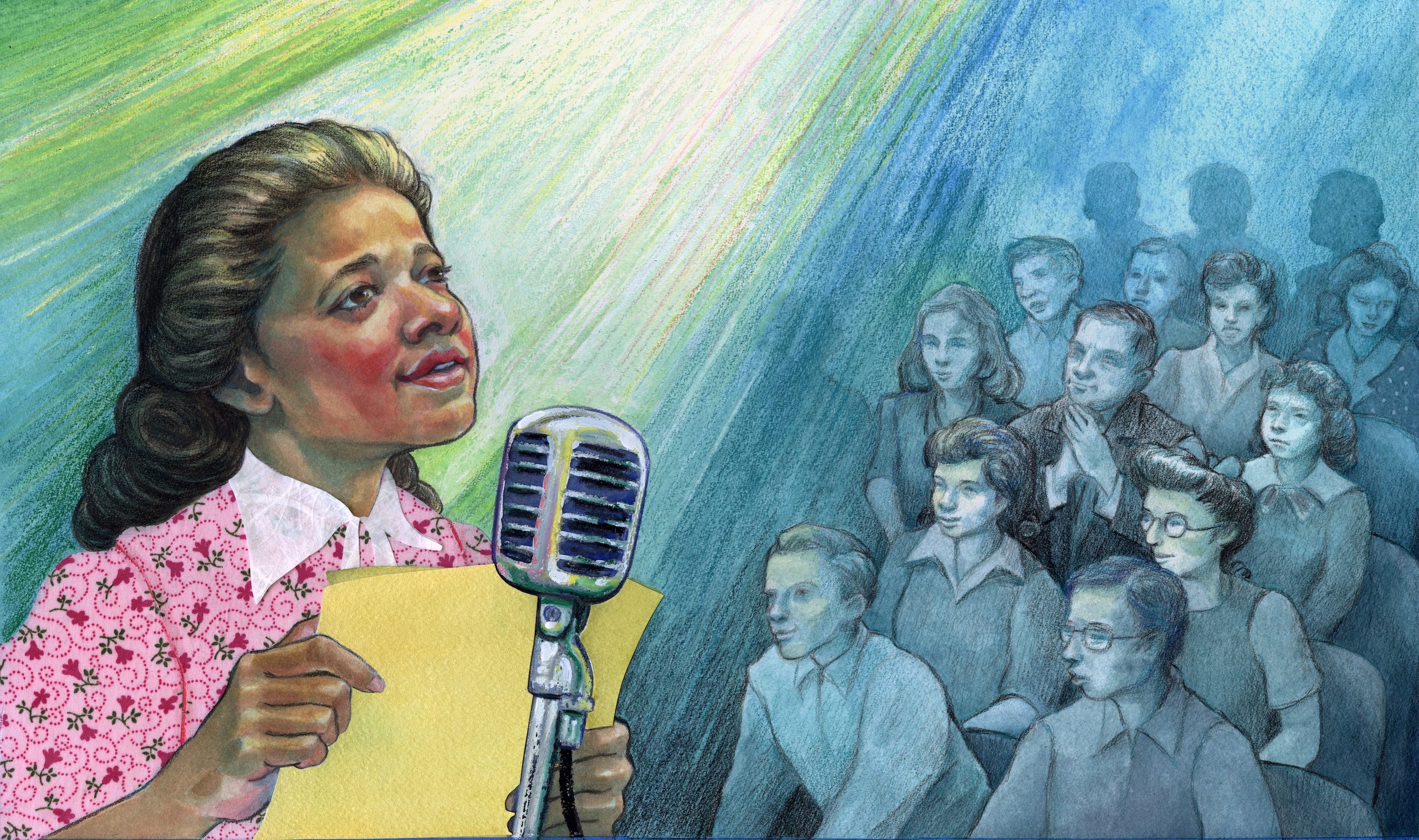“Black Panther: Wakanda Forever” is proving to be an even bigger box office smash than the original “Black Panther” movie. In just three weeks after its theatrical release, it topped $700 million at theaters around the world. And it’s not just a cinematic juggernaut; it’s also a cultural touchstone.
The “Black Panther” movies are the first superhero blockbusters with an African-American director and a predominantly Black cast. They’ve also sparked a lively dialogue — and sometimes sharp critiques — about how Hollywood tells stories about Africa. And all this has raised a tantalizing question: how do Africans tell stories about their own imagined future?
There’s already plenty of evidence for how this is being done — African science fiction is booming. These are stories shaped by African sensibilities, written by authors across the African continent.
News with a little more humanity
WPR’s “Wisconsin Today” newsletter keeps you connected to the state you love without feeling overwhelmed. No paywall. No agenda. No corporate filter.
To get a sense of where African science fiction is heading, Steve Paulson of WPR’s “To The Best of Our Knowledge” recently talked with Nnedi Okorafor and Ainehi Edoro. Okorafor is an acclaimed science fiction writer and the author of several Marvel comic books featuring “Black Panther” characters. Edoro is a literary scholar at the University of Wisconsin-Madison, where she’s now teaching a class on African science fiction and fantasy.

Edoro and Okorafor are also friends who share a common heritage. Edoro is a native of Nigeria who originally moved to the U.S. to attend college. Okorafor is the daughter of Nigerian immigrants and was born and raised in the Chicago suburbs.
Both Okorafor and Edoro are leading figures in the world of contemporary African literature. Edoro is the founding editor of Brittle Paper, an online magazine about African literature. And for more than two decades, Okorafor has been blazing a path for a new kind of speculative fiction.
“Nnedi is at the heart of the emergence of African science fiction,” says Edoro. “There’s no way you can tell the story about the rise of African science fiction and fantasy without talking about Nnedi Okorafor’s work and her attempt to ask difficult questions about this literary form’s social and historical context.”
Some of these difficult questions have to do with the explosion of interest in “Afrofuturism” — a word that Okorafor has tried to clarify and redefine. In the process, she’s also coined a new word, “Africanfuturism,” to represent an African-centered worldview.
This interview has been edited for clarity and length.
Steve Paulson: Nnedi, a few years ago, you called yourself an Afrofuturist, but more recently, you’ve said that label doesn’t really fit anymore. And you’ve drawn a distinction between Afrofuturism and Africanfuturism. Can you explain the difference?
Nnedi Okorafor: For a while, I tried to embrace the term of Afrofuturism, and then around 2018, when the “Black Panther” film came out, I began to understand that I was doing something else that didn’t fit. I was writing narratives that were not from the perspective of direct descendants of African slaves, or “stolen” Africans, as I prefer to say.
So that’s when I coined the term Africanfuturism. It’s in the same universe as Afrofuturism, but it is more directly rooted in African culture, history, mythology and point of view.
SP: What’s an example of the difference between Africanfuturism and Afrofuturism?
NO: The example I always give, because people know this pretty well, is from the “Black Panther” films, which are Afrofuturist. At the end of the first movie, Wakanda builds an outpost, and their first instinct is to build it in Oakland, California, in the United States.
If “Black Panther” were an Africanfuturist narrative, a lot of things would be different. Wakanda would build their outpost in a neighboring African country.
SP: Ainehi, how do you think about a huge Hollywood blockbuster like “Wakanda Forever”?
Ainehi Edoro: I would say that for the longest time, Afrofuturism was enough for me in naming a certain kind of Black imagination of the future. That changed when Nnedi began to advocate for this new term.
Thinking about the future as it relates to Black experience is not the same everywhere. Afrofuturism is an idea in science fiction that is centered on the Black experience in America, which is framed in relationship to slavery and is also in conversation with whiteness.
This is going to look completely different when we go to a space where the history is framed by colonialism, and in which science fiction or fantasy or the future is always speaking to a very specific archive of knowledge.
SP: Is it a problem that these two “Black Panther” movies about an idealized African country are made from an American perspective? If these movies were made in Nigeria, they would look totally different.
AE: No, I don’t think it’s a problem. “Black Panther” is a very important cultural event. I think that the world needed “Black Panther.” But how well does “Black Panther” represent a kind of African imagination of the future? I don’t know that it does that very well, but that’s not its project. The problem comes when we begin to expect “Black Panther” to encompass every Black experience in the world.
SP: Nnedi, you’ve been immersed in the “Black Panther” world. You’ve written Marvel Comics about its characters. How do you think about these questions?
NO: For me, it’s complicated. These were things that I grappled with when I was trying to decide whether I was going to write T’Challa and Shuri, T’Challa’s little sister. I agree with everything that Ainehi just said.
My issues with Wakanda go down to the very bones of it — the existence of a landlocked African country that is supposed to be the wealthiest and most technologically-advanced nation in the world. But it never participated in helping with issues of slavery and colonialism. It never gave back to any of the African countries around it. And the idea of this advanced nation being a monarchy is an issue for me. It’s technologically advanced and futuristic, but it’s a monarchy, really?
SP: It also seems odd that Wakanda is an incredibly sophisticated country, but practically the only places where you see this advanced technology is in its weapons and spacecrafts, and in the one science lab that Shuri runs. It doesn’t seem very futuristic.
AE: No, and this emphasis on weapons as kind of the central figuration of the future speaks to the ways in which “Black Panther” betrays itself as a Western project. In fact, the very idea of vibranium as an extractive technology, it’s almost as if everything that the West did to make itself powerful in the world is just taken and layered on an African world. Whereas a truly decolonial representation of the future is one that will essentially evacuate everything about the West that has led to its greatness, but that has also led to its violence and inequities.
So if you look at Wakanda from a certain perspective, it’s the West that you’re seeing, but acted out by Black bodies. It doesn’t push as far as it could have pushed in terms of truly reimagining what a future that is centered on Africa can really look like.
If you want to see how that is done at the level of storytelling, I would check out a book like Nnedi’s “Lagoon,” where literally the geopolitics of the world shifts from land to water, from the West to Africa.
SP: So you’re really talking about how to decenter the West, how to tell these stories about the future from a non-Western perspective?
NO: Yeah, it’s a different worldview. And that results in a different type of narrative, a different envisioning of what the future will be like, with different wants and needs and goals and ideas. Because Western culture dominates things so much, this is often very difficult for people to imagine and understand.
AE: A retold “Black Panther” that hangs on an African worldview might have three characteristics. One, whiteness will not be legible. It’s just not a space where whiteness will be a thing that you even have to think about. So it would be a world that’s very, very, very Black.
One thing I love about African worlds is the chaos and the messiness of it. It doesn’t mean it’s disorderly. You know, sometimes people mistake the two. It’s just a world that is not obsessed with forcing everything into categories and hierarchies. And it would be a world that puts an end to all these things that are wrapped up with colonialism — like extractive capitalism.
And lastly, it’s a world that decenters the human. You see this all over African science fiction and fantasy. These are stories that are very invested in imagining ways that we can decenter the human as the space of life, of value, of form — that allows the animal to exist in much more interesting ways, that allows mythical figures, ancestral figures to exist.
SP: It’s fascinating what you’re saying about decentering the human. Nnedi, does this idea factor into how you write your novels?
NO: Oh, yes, very much so. Just on a philosophical scale, when we think about climate change and what we’ve done to this planet, when you decenter the human, you start seeing answers. The ecosystem is not hierarchical where human beings are on top and everything on this planet is there for us to use.
When you decenter the human, you’re less likely to build technologies that destroy the living things around you to make you comfortable.
SP: Ainehi, you said this African worldview also draws on myths and folklore. Science fiction is futuristic, but talking about the ancestors is looking to the past. How do you bring those two together?
AE: One of the things that became clear after my students and I started to advance in our foray into African science fiction is the extent to which many authors take from the past in order to create iconographies of the future. So one image that keeps popping up in novels is the masquerade.
This is a figure that appears everywhere — a very pervasive and ancient tradition in many African worlds, these are ancestral figures who come into the world of the human in the form of different kinds of masquerades. In the Yoruba tradition, there are Gelede festivals where there’s a belief that it’s literally the ancestors appearing from the forest when they come in these really elaborately-designed costumes.
They are figures of the past, but also figures of the future. It means if I die, I’m going to meet my ancestors in the future. So they’re in the past, but they are in the present and they are also relevant to the future as well. In some of the stories we read, writers would take these figures and reenergize them or rethink them within the context of the future.
African science fiction writers do not see the past as a kind of dead time that they don’t have to engage with.
SP: Nnedi, I would think that as a creator of imaginative worlds, it must be so enriching for you to be able to draw on all of these mythical characters from different African traditions to write a novel about the future.
NO: Yeah, for me, masquerades are big. They’re very much the center of my work, my imagination. I see the past, present and the future all mixed together. I literally don’t see the ancestors as beings of the past. They’re very much the present. They’re very much part of the future.
When I’m writing, I feel them looking over my shoulder. I feel them affecting everything that I do. Like when I’m writing, I can see them dancing. They’re beside me. They’re criticizing what I’m doing. They’re telling me, ‘Don’t write that.’ You know, they’re telling me, ‘Write that.’ I feel them. I’ve always felt my ancestors very strongly, even before I was a writer.
SP: Ainehi, a few years ago, you wrote an essay that proved to be somewhat controversial about Chinua Achebe, one of the giants of modern African literature. He wrote an essay in 1965, where he said African writers had this moral imperative to be a teacher, to teach their readers about the horrors of colonialism and the trauma of feeling racially inferior. And you said that edict from half a century ago just doesn’t hold up anymore. What’s missing in that way of thinking?
AE: I think it’s a way of thinking that captures his moment beautifully in the sense that decolonization is a very specific kind of project. Achebe saw himself at the forefront of a cultural reengineering, a revolution that needed to happen.
But for somebody like me, looking back at that statement, I bristle at it a little because I am not in the eye of the war against colonialism in the way that Achebe was. What keeps me up at night is different from what bothered him. I can sympathize with the ways in which realism came to be the right African form to pursue and why we should all be on message as we are fighting this really powerful cultural enemy.
Today, we are still fighting colonialism, but it’s a different fight. Part of the fight today is to be able to tell different kinds of stories. We are not trying to stay on message, on brand. We are trying to literally break the frames of reference and open up a space where we can reach people through romance fiction, through science fiction, through graphic novels. And so that decentralization has created a space where we are able to resist the system or fight the fight by making a space where storytelling can proliferate in different forms.



